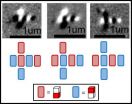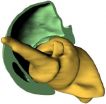(Press-News.org) KINGSTON, R.I. – July 1, 2011 – Tiny marine organisms called zooplankton can use specialized adaptations that allow them to hide from predators in areas of the ocean where oxygen levels are so low that almost nothing can survive, but they may run into trouble as these areas expand due to climate change.
"Oxygen minimum zones are very difficult places to survive," said University of Rhode Island doctoral student Leanne Elder. "But we have discovered that these tiny animals have adapted in two specialized ways. First, they suppress their metabolism, which is very much like hibernation in other animals. Second, while converting food into energy normally requires large amounts of oxygen, these zooplankton use a different process - anaerobic glycolysis - which allows them to use only small amounts."
The tiny animals use the oxygen minimum zones as refuges from predators, migrating vertically down into the zone during the day and returning at night to feed in the oxygen- and food-rich areas closer to the surface.
However, oxygen minimum zones are predicted to expand into shallower waters as global warming continues, which will force the zooplankton into a narrow band of water during the night and making them susceptible to their main predators -- fish. If this causes a population crash in these animals, it will have impacts all the way up the food chain.
A resident of Cranston, R.I., Elder will present the results of her research today at the annual conference of the Society for Experimental Biology in Glasgow, Scotland.
Although the oxygen minimum zone provides a refuge for zooplankton, spending time there does have a cost to the animals: anaerobic glycolysis results in a build up of acid that they can only dispose of when they return to surface waters. Elder said that future research needs to be done on how the reduction in oxygen- rich habitat will affect these animals and hence the whole ocean ecosystem.
### END
Climate change could turn oxygen-free seas from blessing to curse for zooplankton
2011-07-02
ELSE PRESS RELEASES FROM THIS DATE:
Magnetic memory and logic could achieve ultimate energy efficiency
2011-07-02
Future computers may rely on magnetic microprocessors that consume the least amount of energy allowed by the laws of physics, according to an analysis by University of California, Berkeley, electrical engineers.
Today's silicon-based microprocessor chips rely on electric currents, or moving electrons, that generate a lot of waste heat. But microprocessors employing nanometer-sized bar magnets – like tiny refrigerator magnets – for memory, logic and switching operations theoretically would require no moving electrons.
Such chips would dissipate only 18 millielectron ...
New study suggests severe deficits in UK honeybee numbers
2011-07-02
A study published by the University of Reading's Centre for Agri Environmental Research suggests that honeybees may not be as important to pollination services in the UK than previously supposed. The research was published in the Journal Agriculture, Ecosystems and Environment.
"Pollination services are vital to agricultural productivity in the UK" says lead author Tom Breeze "as of 2007, 20% of the UK's cropland was covered by insect pollinated crops like oilseed rape and apples. For decades now we have assumed that honeybees have been providing the majority of pollination ...
Research reveals new secret weapon for Le Tour
2011-07-02
Winning margins in the Tour de France can be tight – last year just 39 seconds separated the top two riders after more than 90 hours in the saddle. When every second counts, riders do everything possible to gain a competitive advantage – from using aerodynamic carbon fibre bikes to the very latest in sports nutrition.
Now there could be a new, completely legal and rather surprising weapon in the armoury for riders aiming to shave vital seconds off their time – beetroot juice.
Research by the University of Exeter, published in the journal Medicine and Science in Sports ...
Karlsruhe Institute of Technology: Nature uses screws and nuts
2011-07-02
A musculoskeletal system so far unknown in the animal world was recently discovered in weevils. The hip of Trigonopterus oblongus does not consist of the usual hinges, but of joints based on a screw-and-nut system. This first biological screw thread is about half a millimeter in size and was studied in detail using synchrotron radiation. The discovery is reported by the current issue of the Science magazine. (DOI:10.1126/science.1204245)
"Such a construction for animal leg movement is quite unusual, as large areas of skeletal parts move on top of each other. Supply ...
Canvas Prints Made Even Easier with Photo Montage Service at PhotoInCanvas
2011-07-02
Canvas prints specialists PhotoInCanvas has implemented a superb new feature at the site which helps customers that just can't choose which image to use. If people have too many great shots of a similar theme to choose from, then the team at PhotoInCanvas can put all of them into a fantastic photo canvas.
This feature may be perfect for individuals that have been to an event such as festival where an abundance of photographs are taken. PhotoInCanvas is urging customers to send them all in so they can group them together to create a stunning image.
The PhotoInCanvas ...
Star Partner Receives The GPWA Seal Of Approval
2011-07-02
On the 22 June 2011 Star Partner received their GPWA sponsorship. Having the Seal of Approval from the GPWA signifies that Star Partner is of a professional standard.
GPWA has over 10,000 public and private registered members and is the only professional organisation of its kind. The GPWA Seal of Approval is awarded to gambling portal websites that meet certain standards and the GPWA code of conduct. Being part of the GPWA enables public and private members to be part of online forums with in-depth news and advice about new industry developments, online gaming law, ...
Earlier exit from hospital after hip operation
2011-07-02
Discharged from the hospital within two days of a total hip replacement operation? It's possible, thanks to the new 'Fast Track' protocol that underwent testing in the U.S., in response to both patient requests for shorter hospital stays and economic realities of providing medical care. According to Dr. Lawrence Gulotta and colleagues, from Hospital for Special Surgery in New York, a carefully screened group of patients undergoing total hip replacement can be discharged from the hospital two days after surgery, without any increase in complications or adverse effects compared ...
Research examines dentists' role in painkiller abuse
2011-07-02
PROVIDENCE, R.I. [Brown University] — The Obama administration turned a bright spotlight on prescription painkiller abuse in April when the Office of National Drug Control Policy released a national action plan and a statement from Vice President Joe Biden. With a cover article in the July edition of the Journal of the American Dental Association (JADA), dentists focus that spotlight on themselves both as major sources of opioid drugs and as professionals with largely untapped power to recognize and reduce abuse.
"Many dentists really haven't even perceived there to be ...
Grand Rapids Dentist Keeps Patients In The Know With Smile Update
2011-07-02
Recognized as an expert in the field of cosmetics and technology in dentistry, Dr. Lambert, Grand Rapids dentist, is pleased to offer patients ongoing valuable insight to dentistry with his practice newsletter, Smile Update. These updates were created to offer patients a way to remain up-to-date with not only the office, but current dental health issues as well, and can be accessed via the practice's website.
The Smile Update, by Dr. Thomas Lambert, was created to improve patient's' dental health and awareness. Patients can visit the practice's website to access this ...
Mutations can spur dangerous identity crisis in cells
2011-07-02
As our bodies first form, developing cells are a lot like children put on the school bus with their names and addresses pinned to their shirts.
The notes identify one as a future heart cell, another as a liver cell, a third as a neuron. And that's what they each grow up to be.
But once those cells reach adulthood, changes to those original marching orders caused by aging, disease and other stressors like smoking can precipitate a kind of identity crisis, researchers at the University of Michigan Health System have found.
The cells start to forget things like which ...


